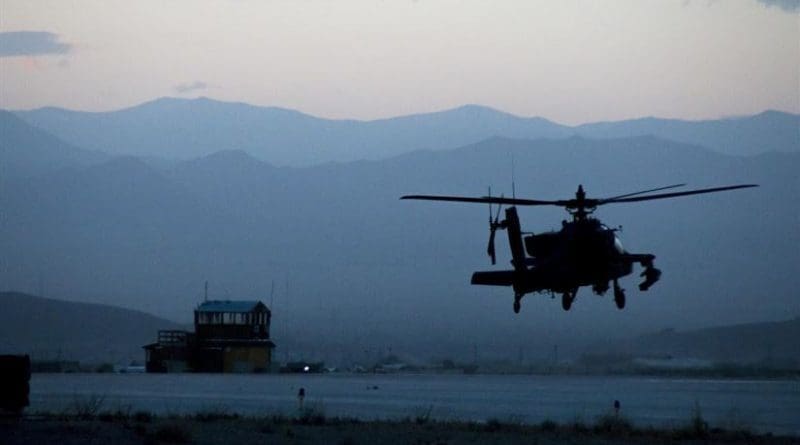Bangladesh Confirms Talks With US For Fighter Jets, Combat Helicopters
By BenarNews
By Kamran Reza Chowdhury
Bangladesh is negotiating to purchase fighter jets, missiles systems and combat helicopters from the United States, a Bangladeshi official said Wednesday, underscoring that the South Asian nation was taking steps to modernize its armed forces.
A senior official of Bangladesh’s ruling Awami League party gave the confirmation after local reports quoted unidentified U.S. officials as saying that negotiations were taking place for Dhaka to acquire advanced military equipment.
“We have been in negotiation with the United States regarding procurement of attack helicopters, fighter planes and missiles,” retired Col. Faruk Khan, chairman of the parliamentary Standing Committee on Foreign Affairs, told BenarNews without elaborating.
“The addition of attack helicopters such as Apaches and modern missile systems from the United States will definitely modernize our armed forces,” he said. “This will be a good achievement.”
Khan also is a member of parliament’s Standing Committee on Defense.
“We want to modernize our armed forces, keeping the world’s modern armed forces in mind,” Khan said. “That is why, we have been trying to procure sophisticated military equipment from the United States and other developed countries.”
The negotiation marks the first time that Dhaka, which has relied heavily on purchases of military hardware from China, has approached Washington for defense equipment since Bangladesh achieved its independence in 1971, security analysts told BenarNews.
Bilateral agreements
In Washington, a U.S. State Department official said that two pending bilateral agreements – the Acquisitions and Cross Servicing Agreement (ACSA) and the General Security of Military Information Agreement (GSOMIA) – would “reaffirm” that Dhaka and Washington have common regional and global interests.
“The United States has such agreements with over 100 countries,” said the U.S. official, who requested anonymity because he was not authorized to discuss potential foreign defense sales.
“These agreements have not and do not in any way commit a country to military action,” the official told BenarNews on Wednesday.
The two agreements would be required before the transfer of military equipment. GSOMIA does not commit governments to share information, but commits governments to protect classified military information, if shared, the official said.
ACSA would facilitate the transfer of fuel from Bangladesh military to visiting U.S. naval ships and aircraft participating in annual training exercises. That deal would work both ways, allowing Bangladesh naval ships to operate outside of their normal areas, the official said.
“Together, we are working to expand partnerships in humanitarian assistance and disaster relief, peacekeeping, defense trade, military cooperation, and counterterrorism, as well as maritime security and regional issues,” he said.
Khan, the Bangladeshi official, said bilateral talks related to ACSA and GSOMIA were ongoing.
Bangladesh made the initial request to acquire the military equipment back in 2018, the Dhaka Tribune quoted an unnamed U.S. Embassy official as saying during a conference with a select group of reporters on Oct. 17. The officials did not provide figures involved in the planned acquisition.
Janes.com, a leading news website for military and security issues, quoted an unnamed U.S. official on Wednesday as saying that the two agreements would deepen “bilateral defense and security ties” between the two countries.
Analyst: ‘A big development’
Since the 1980s, Bangladesh’s 157,000-member military had purchased equipment from China, its traditional main weapons supplier, Russia, Great Britain and South Korea.
“Bangladesh had been a least-developed country. The United States did not sell military equipment to Bangladesh for decades as we were not considered trustworthy for maintaining secrecy of the military supplies from America,” Retired Brig. Gen. Sakhawat Hossain, a Bangladeshi security analyst, told BenarNews.
“It is a big development that the United States is now considering selling Apache helicopters to Bangladesh,” he said. “Washington would usually not sell advanced military equipment to Bangladesh as the Chinese have a huge influence on the Bangladeshi military.”
Bangladesh’s Air Force includes fighter planes from Russia, the United Kingdom and France and at least six 1970s-era Mil Mi-17 transport helicopters and three Bell utility helicopters, officials said. Dhaka’s military expenditure, totaling about U.S. $3.2 billion in 2017 to 2018, accounts for about 6 percent of its annual budget, according to official statistics.
Bangladesh planned to initially purchase eight attack helicopters with Turkish-built T-129 and Russian Mi-35M considered to be front contenders, but the U.S. Apache AH-64E trumped all competitors, according to South Asia Monitor. It said negotiations between U.S. and Bangladeshi officials were scheduled later this year.
But Foreign Secretary Shahidul Haque told BenarNews that he could not confirm the Janes.com and Dhaka Tribune reports.
“I have no idea about such agreements,” he said.
The Stockholm International Peace Research Institute, which monitors military spending worldwide, said China had monopolized Bangladesh’s acquisition of defense supplies in the 1980s amounting to more U.S. $1 billion.
Beijing dominated military sales to Bangladesh since 2010, reaching almost U.S. $2 billion, SIPRI said. On Oct. 16, Janes.com reported that two frigates decommissioned by China’s People’s Liberation Army Navy “appear close to being transferred to the Bangladeshi Navy.
The 2,200-ton diesel-powered ships, formerly Lianyungang and Putian have been undergoing overhaul at the Shenjia shipyard in Shanghai, it said,” citing photos it had monitored on Chinese online military forums.
It was not immediately clear how the negotiations would impact Dhaka’s diplomatic and military relations with Beijing. But Khan, the Bangladeshi legislator, said he did not believe the defense acquisition from the United States would anger China.
“We are not in an obligation to procure military equipment from a particular country,” he said.

